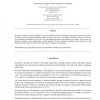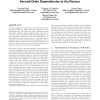641 search results - page 41 / 129 » Embedding Finite Sets in a Logic Programming Language |
JAR
2010
13 years 3 months ago
2010
Nominal logic is a variant of first-order logic with special facilities for reasoning about names and binding based on the underlying concepts of swapping and freshness. It serves ...
ICLP
2009
Springer
14 years 8 months ago
2009
Springer
Probabilistic logic programs (PLPs) define a set of probability distribution functions (PDFs) over the set of all Herbrand interpretations of the underlying logical language. When...
ICLP
2003
Springer
14 years 1 months ago
2003
Springer
In recent research on nonmonotonic logic programming, repeatedly strong equivalence of logic programs P and Q has been considered, which holds if the programs P ∪ R and Q ∪ R h...
LPNMR
2004
Springer
14 years 1 months ago
2004
Springer
This paper develops a declarative language, P-log, that combines logical and probabilistic arguments in its reasoning. Answer Set Prolog is used as the logical foundation, while c...
PODS
2004
ACM
14 years 8 months ago
2004
ACM
A schema mapping is a specification that describes how data structured under one schema (the source schema) is to be transformed into data structured under a different schema (the...


